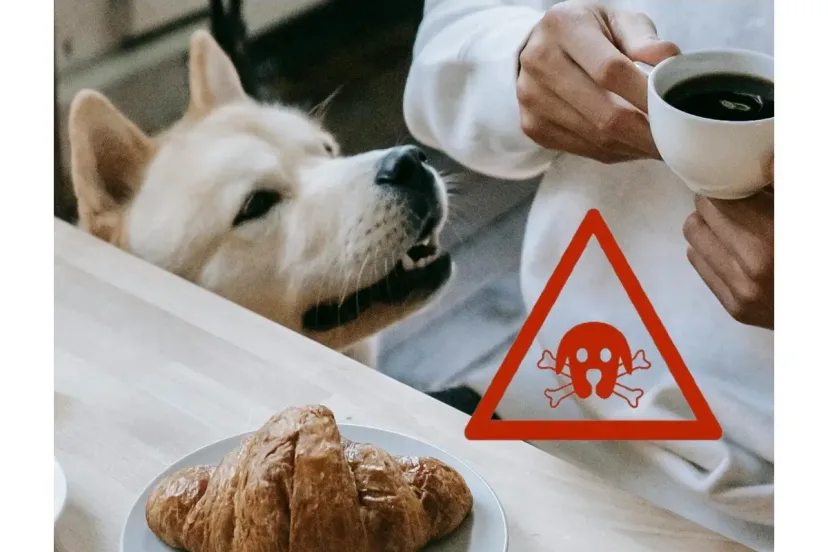Toxic Food for Dogs: Essential Guide for Responsible Dog Parents
As devoted responsible dog parents, we often extend our love by sharing our favorite foods with our furry companions. But it’s crucial to understand that some human foods are toxic food for dogs. Consider that while some fruits and veggies, which are healthy and harmless to people, can cause serious health issues for our doggies. Navigating the world of dog-friendly foods can be tricky. With over 26,000 pet poisonings annually, as a result of toxic food for dogs, occurring in the US alone, it’s crucial to stay informed.
On the flip side, certain human foods can benefit our dogs, promoting joint health, fresher breath, and even allergy resistance. However, it’s essential to know the difference between what’s safe and what a toxic food for dogs is that could land your dog in the emergency room.
Even healthy foods, when given in excess, can lead to obesity in dogs, a prevalent issue in the United States. To ensure your dog’s well-being, always prioritize a balanced, high-quality dog food as their primary diet. Let’s explore some of the common foods that are dog-friendly and which ones should be avoided at all costs.
I understand the importance of keeping our furry companions safe from harm, as a dog parent of over 5 decades. In this guide, I’ll share valuable insights into toxic food for dogs, ensuring you make informed choices to keep your canine friend healthy and happy.
Common Toxic Food for Dogs
Chocolate, Coffee, Tea, Cola Drinks and Caffeine
One of the most well-known toxic food for dogs is chocolate because it contains theobromine, methylxanthines and caffeine, which can cause vomiting, diarrhea, seizures, and even death to dogs. Methylxanthines are present in cacao seeds used to make chocolate, coffee beans, tea (black and green tea), cola drinks and are found in many respiratory medications and stimulants.
When dogs ingest methylxanthines, they may experience a range of symptoms, including vomiting, diarrhea, increased thirst and urination, hyperactivity, irregular heartbeats, tremors, seizures, and in severe cases, even death. It’s best to keep these foods away from your four-legged companion to ensure their safety and well-being.
Grapes and Raisins
Even small amounts of grapes or raisins can lead to kidney failure in dogs, causing symptoms such as vomiting, lethargy, and decreased urine production.
Ever wondered why grapes and raisins are toxic food for dogs and therefore a big no-no? While the exact toxic substance remains unclear, these seemingly harmless fruits, which are healthy for people, have been linked to kidney failure in canines. Due to the uncertainty surrounding the toxic component, it’s safer to steer clear of feeding grapes and raisins or any foods containing or made from them, to our furry pals.
Even a small amount of these fruits can lead to serious health issues for dogs, including vomiting, diarrhea, lethargy, and ultimately, kidney failure. To keep your canine companion safe and healthy, it’s best to stick to dog-friendly treats and avoid the temptation to share any foods that contain or are made from grapes or raisins with them.
Onions, Garlic and Chives
These common kitchen ingredients contain compounds that can damage a dog’s red blood cells, leading to anemia and gastrointestinal upset. While these ingredients may add flavor to our meals, they contain compounds that can irritate a dog’s digestive system and potentially damage red blood cells, leading to anemia.
Even small amounts of these foods, whether raw, cooked, or powdered, can pose a risk to your furry friend. Symptoms of ingestion may include vomiting, diarrhea, weakness, and pale gums. It’s essential to be mindful of what you’re cooking around your canine companion and avoid sharing dishes or foods seasoned with onions, garlic, or chives with them.
Alcohol
Even small amounts of alcohol or food products containing alcohol can lead to a range of severe symptoms in dogs, including vomiting, diarrhea, decreased coordination, difficulty breathing or respiratory failure, and even coma or death.
Alcohol affects dogs differently than it does humans, and their bodies cannot metabolize it as efficiently, leading to faster and more severe intoxication. It’s crucial to keep all alcoholic beverages and foods containing alcohol securely out of your dog’s reach, and under no circumstances should you intentionally give alcohol to your furry friend. If you think that your dog has ingested alcohol or food containing alcohol, contact your veterinarian or the ASPCA Animal Poison Control Center immediately.
Raw Meat, Raw Eggs and Bones
Feeding your dog raw or undercooked meat, eggs, or bones may seem like a natural choice, but it can pose serious health risks to your furry friend. Raw meat and eggs may contain harmful bacteria like Salmonella and E. coli, which can cause illness in both dogs and humans. Additionally, raw eggs contain avidin, an enzyme that can interfere with biotin absorption, leading to potential skin and coat problems for your dog.
While giving your dog raw bones might mimic their natural diet in the wild, it can be extremely hazardous in a domestic setting. Your dog could choke on bones or suffer from severe injuries if the bone splinters and punctures their digestive tract.
Salt and Salty Snack Foods
Sharing salty snack foods like potato chips and pretzels with your dog may seem harmless, but it can be quite dangerous. These snacks contain high levels of salt, which can lead to excessive thirst, urination, and even sodium ion poisoning in dogs. If your dog consumes too much salt, you may notice symptoms like vomiting, diarrhea, depression, tremors, elevated body temperature, seizures, and in severe cases, death.
By making mindful choices about what you feed your dog, you can prevent potential health complications and ensure they lead a happy and vibrant life.
Avocado
Avocado, while popular among humans for its creamy texture and health benefits, is a toxic food for dogs due to its persin content. Persin, found predominantly in the peel, leaves, and pits, is a fungicidal toxin that can wreak havoc on a dog’s health if ingested. These parts of the avocado should always be kept away from your furry friend to prevent serious health problems. However, the flesh or pulp of the avocado contains lower concentrations of persin, making it generally safe for dogs to consume in small amounts. Despite this, it’s essential to be cautious and monitor your dog for any adverse reactions if they happen to ingest avocado flesh.
Consuming avocados can lead to additional health complications for dogs beyond gastrointestinal issues. In some cases, ingestion of avocados may result in fluid accumulation in the lungs and chest, leading to breathing difficulties and potentially fatal oxygen deprivation.
Seeds/Pits: Apple, Apricot, Cherry, & Plum
Seeds and pits from fruits like apples, apricots, cherries, and plums contain cyanide, making them unsafe for canine consumption. Ingesting these pits can lead to a range of serious symptoms in dogs, including vomiting, rapid heartbeat, seizures, and even death. The cyanide interferes with the ability of red blood cells to transport oxygen effectively, resulting in potentially life-threatening consequences for your beloved dog. When it comes to sharing fruits with your furry friend, it’s essential to be mindful of certain parts that can pose serious risks to their health.
Apples
Apples are packed with essential nutrients like vitamin C, vitamin A, potassium, and antioxidants, making them a fantastic addition to your dog’s diet. Additionally, the fiber content, particularly in the peels, promotes healthy digestion and weight management for your furry friend. By incorporating apples into your dog’s snacks or meals in moderation, you can provide them with a tasty and nutritious treat that supports their overall well-being.
While the flesh of apples is generally safe for dogs to enjoy as a tasty treat, the core and seeds contain cyanide, a toxic compound that can be harmful in large quantities. While it’s unlikely that a small number of apple seeds will cause harm, it’s best to err on the side of caution and avoid feeding your dog the core and seeds altogether.
Apricots
Enjoying apricots in moderation can indeed be a healthy addition to your dog’s diet, providing various potential health perks like better digestion and reduced blood pressure. However, it’s crucial for dog parents to exercise caution and ensure that they remove all parts of the apricot that contain cyanide, such as the pit, stems, and leaves, before offering this stone fruit to their furry companions. While the flesh of the apricot is generally safe for dogs to consume, these other parts can pose a risk due to their cyanide content.
Cherries
Dogs can enjoy cherries safely, but it’s important to remove the pits and stalks beforehand as they can pose a choking hazard and contain substances that are harmful to dogs. Despite this precaution, cherries are packed with nutritional goodness, offering benefits like 3.23 grams of fiber, 10.8 milligrams of vitamin C, and 342 milligrams of potassium per cup. These nutrients can contribute to your dog’s overall health and well-being when incorporated into their diet in moderation. So, while cherries can be a tasty and nutritious treat for your furry friend, always be mindful of removing any potentially harmful parts before sharing them.
Plums
Although the flesh and skin of plums are typically safe for dogs, caution should be exercised regarding the pits, which contain cyanide and pose a risk if ingested. While plums can be enjoyed by dogs in moderation as an occasional treat, it’s crucial to remove the pit before feeding them to your furry friend. Plum pits are not only toxic but also present a choking hazard and can potentially cause intestinal blockages. By removing the pit and offering only the flesh in controlled amounts, you can ensure a safe and enjoyable snacking experience for your doggie.
Effects of Toxic Foods on Dogs
Consuming toxic food for dogs can have devastating effects on their health. From gastrointestinal upset to organ damage, the consequences can be severe and sometimes fatal.
Gastrointestinal Upset: Symptoms such as vomiting, diarrhea, and abdominal pain are common when dogs ingest toxic foods, causing discomfort and distress.
Kidney Failure: Certain foods like grapes and raisins can lead to kidney failure in dogs, a serious condition that requires immediate veterinary intervention.
Liver Damage: Foods containing xylitol or certain toxins can cause liver damage in dogs, leading to jaundice, lethargy, and loss of appetite.
Neurological Issues: Some toxic foods can affect a dog’s neurological system, causing symptoms like tremors, seizures, and disorientation.
Safe Foods for Dogs
While some human foods are toxic food for dogs, others can be safely incorporated into their diet as treats or additions to their regular meals. Treats and additional food items should not surpass 10% of your dog’s daily caloric intake.
Lean Meats: Cooked lean meats like chicken, turkey, and beef can provide dogs with a healthy source of protein and essential nutrients.
Fruits: Certain fruits like apples (without seeds), bananas, and blueberries can be offered to dogs in moderation as tasty and nutritious snacks.
Vegetables: Dogs can enjoy a variety of vegetables, including carrots, green beans, and sweet potatoes, which offer vitamins, minerals, and fiber.
Plain, Cooked Rice and Pasta: Plain rice and pasta can be a bland and easily digestible option for dogs with sensitive stomachs or recovering from gastrointestinal upset.
Peanut Butter (Xylitol-Free): Peanut butter can be a delicious treat for dogs, but it’s essential to choose varieties that are free of xylitol, a dangerous sweetener.
Tips for Avoiding Toxic Food for Dogs
Preventing accidental ingestion of toxic foods is key to keeping our dogs safe and healthy. Here are some tips to help you avoid potential hazards in your home:
Keeping Foods Out of Reach: Store toxic food for dogs securely out of their reach, whether in cabinets, high shelves, or sealed containers. Making sure that counter surfacing dogs can not get access to any toxic food for dogs.
Keep trash cans securely closed and out of your dog’s reach. Invest in dog-proof containers for storing food, treats, and other edible items.
Educating Family and Guests: Ensure that family members and visitors are aware of which foods are off-limits for dogs and the potential consequences of feeding them.
Reading Ingredient Labels: When purchasing packaged foods, carefully read ingredient labels to check for any potentially harmful substances like xylitol or onions.
If you are uncertain or in doubt about toxic food for dogs, you can call your veterinarian or refer to the Pet Poison Helpline’s Poison List to make sure it is safe for your dog.
Conclusion
As devoted dog parents, it’s essential to recognize the potential dangers lurking in our favorite foods that are toxic food to dogs and can harm our furry companions. While some human foods offer health benefits to dogs, others can pose serious risks and lead to detrimental health issues.
To ensure our dogs’ well-being, we must prioritize feeding them a balanced, high-quality diet while avoiding toxic food for dogs altogether. By understanding the risks associated with common human foods like chocolate, grapes, onions, and alcohol, we can make informed choices to keep our dogs safe and healthy. Additionally, incorporating safe foods for dogs, such as lean meats, fruits, and vegetables, into their diet can provide them with tasty and nutritious treats while minimizing potential health complications. By following these guidelines and remaining vigilant, we can ensure that our beloved canine companions lead happy, healthy, and vibrant lives free from the dangers of toxic food for dogs.
FAQs about Toxic Food for Dogs
Q1.: Which common human foods can be toxic to dogs?
A: Several common human foods, such as chocolate, grapes, onions, garlic, alcohol, and the pits or seeds of certain fruits like apples, cherries, and plums, can be toxic to dogs. These foods contain substances that can cause a range of health issues, including gastrointestinal upset, kidney failure, and even death.
Q2.: How can I recognize if my dog has ingested a toxic food?
A: Symptoms of toxic food ingestion in dogs can vary depending on the type of food and the amount consumed. Common signs include vomiting, diarrhea, lethargy, increased thirst and urination, tremors, seizures, and difficulty breathing. If you suspect your dog has ingested a toxic food for dogs, seek veterinary attention immediately.
Q3.: Are there any safe alternatives to toxic foods for dogs?
A: Yes, there are plenty of safe and nutritious people food alternatives to the ones that are toxic food for dogs. Lean meats like chicken, turkey, and beef, along with fruits like apples (without seeds), bananas, and blueberries, and vegetables such as carrots and sweet potatoes, can be offered to dogs as healthy treats. It’s essential to ensure these foods are prepared and served safely, without any harmful additives or seasonings.
Q4.: How can I prevent my dog from ingesting toxic foods?
A: To prevent accidental ingestion of toxic foods, it’s crucial to store them securely out of your dog’s reach. Educate family members and guests about which foods are off-limits for dogs and the potential consequences of feeding them. Additionally, carefully read ingredient labels on packaged foods to check for any harmful substances like xylitol or onions.
Q5.: What should I do if my dog ingests a toxic food?
A: If you suspect your dog has ingested a toxic food, contact your veterinarian or the ASPCA Animal Poison Control Center at 1-888-426-4435 immediately for guidance. Provide as much information as possible about the type and amount of food ingested, along with any symptoms your dog is experiencing. Swift action is essential to minimize the potential health risks to your furry friend.




